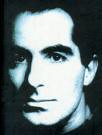



The whole content of my being shrieks in contradiction against itself. Existence is surely a debate... - Kierkegaard
Philip Roth is one of my favorite living writers. I also enjoy Jane Smiley, Anne Tyler, Anne LaMott, J.D. Salinger (does he count?), and I used to love Kurt Vonnegut, but I haven't read anything new in years.
The thing about Philip Roth is I love the way he writes, and I really enjoy his books, but I haven't read everything of his, and I'm not even sure I want to. Portnoy's Complaint is supposed to be one of his best, but from what I hear it's a cross between Literature and American Pie. I don't really want to read about some guy getting (uh-hum) intimate with a piece of liver. The Breast is about a guy who wakes up and, much like Gregor Samsa, finds he has turned into a huge human breast. I may be missing out on something, but I think I'll read Austen instead.
The first book I read of Roth's was American Pastoral, and the book blew me away. It was a seriously fabulous book. It was real. It was devastating. It was about the American Dream - a great kid with a nice life who marries a nice girl and has a daughter. He lives his life well, he's a good dad. But, despite all of that, his life crumbles. His daughter becomes a protester, a fanatic, and a terrorist. It was similar to a Jane Smiley book (where she takes something good and then smashes it) or Anne Tyler (it doesn't sum up nicely or have a good ending, but it's real), but with a different edge.
I started The Human Stain and quit. It was very dark, and although really well written, I chose something lighter. My mother read it and when I told her I had stopped, she said, "Oh, Laura" in her perfect Relief Society President voice and explained how it was what made the book great, and let you understand the characters (or something along those lines). I get all that (and that is one book I do want to pick up again), but sometimes you don't want to read about people with their secrets and their compulsion to hurt other people.
I read The Ghost Writer and The Counterlife. I think I may have read another Zuckerman book in there, but I'm not sure. They were great books. His sexuality plays a bigger role in these books and they were harder to relate to. But, well written and worth reading.
Then, I read three of his early works: Letting Go, When She Was Good, and Goodbye Columbus. They were all truly phenomenal. You could hear the youth in his voice, you could sense the lack of cynicism (he's still cynical, but it's the cynicism of youth). But, that wasn't what made them great. They were great because they sucked you in, and you believed them.
You know what's at the heart of the misery of a breakdown? Me-itis. Microcosmosis. Drowning in the tiny tub of yourself. -Operation Shylock
I just finished Operation Shylock. Great book. Sort of. I mean, it made me think, and laugh, and think some more. It was really well written and the themes explored are truly genius. But, I got this feeling now that he is "PHILIP ROTH: GREAT LIVING WRITER" he doesn't have to edit anymore. The book is 398 pages and there are times I thought this guy is just rolling, he's just letting it all come out and he isn't looking back. Sometimes that's really great. And, sometimes it's just tedious. People in this book are constantly monologuing to each other. One monologue ran on for eight pages. I felt like saying, take a breath. But, then he says something brilliant or funny and you forgive him.
- ...there are occasional anti-Semites, who engage in nothing more really than a little anti-Semitism as a social lubricant at parties and business lunches; moderate anti-Semites, who can control their anti-Semitism and even keep it a secret when they have to; and then there are the all-out anti-Semites, the real career haters, who may perhaps have begun as moderate anti-Semites but who eventually are consumed by what turns out in them to be a progressively debilitating disease.
-Operation Shylock
- "You are that marvelous, unlikely, most magnificent phenomenon, the truly liberated Jew. The Jew who is not accountable. The Jew who finds the world perfectly to his liking. The comfortable Jew. The happy Jew. Go. Choose. Take. Have. You are the blessed Jew condemned to nothing, least of all to our historical struggle."
"No. I said, "not a hundred percent true. I am a happy Jew condemned to nothing who is condemned, however, from time to time to listen to superior Jewish windbags reveling in how they are condemned to everything. Is the show finally over?"
-Operation Shylock
- I cannot and do not live in the world of discretion, not as a writer, anyway. I would prefer to, I assure you - it would make life easier. But discretion is, unfortunately, not for novelists.
-Philip Roth

 Philip Roth
Philip Roth













































